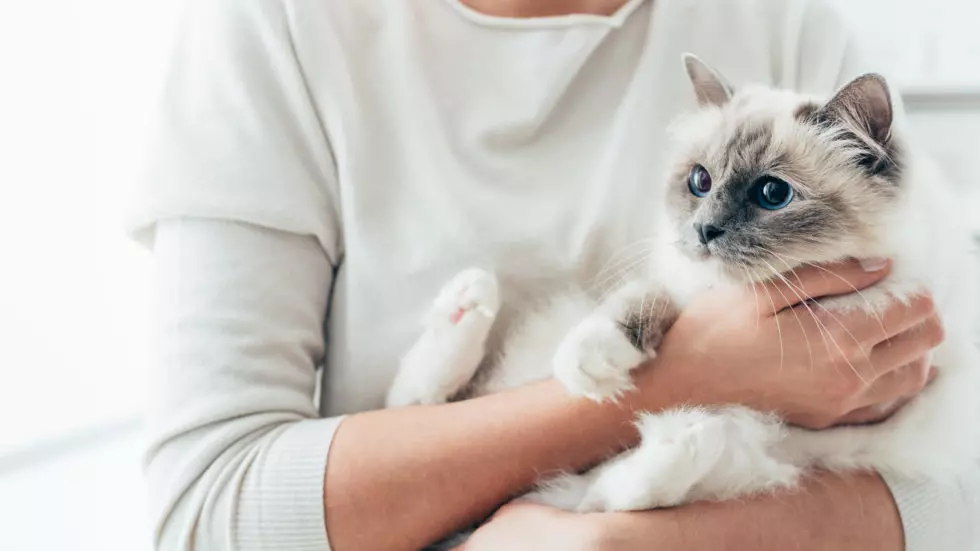
A Dozen of the Best Pets for Social Distancing
If the ‘Tiger King’ and his big cats just really aren’t doing it for you, here is the definitive list of the best pets for social distancing.
In times such as these when limiting (or eliminating) social contact is a must, living at home can be a lonely ordeal. While social distancing has been the most effective means of flattening the curve to date, the emotional toll of social distancing feels all too real.
Having an animal companion is incredibly beneficial for decreasing these feelings of loneliness and social isolation and can significantly boost both mental and physical health. According to a nationally representative survey conducted by the Human-Animal Bond Research Institute (HABRI) and Mars Petcare, 80 percent of pet owners say their pet makes them feel less lonely and 76 percent agree that human-pet interactions can help address social isolation.
To identify the best pets for social distancing, the data science and research team at Insurify referred to data from a variety of sources to rank the best pets based on their affordability, cleanliness, ability to bond with humans, and general practicality in the context of social distancing.
Insights
- National pet ownership statistics: According to estimates by the American Veterinary Medical Association (AVMA) 58.6 percent of American households own a pet.
- Most popular pets: The most popular pets in America are dogs, cats, and birds. Of the 58.6 percent of households in the United States that own a pet, 38.4 percent own a dog, 25.4 percent own a cat, and 2.8 percent own a bird.
- How do most Americans feel about their pets? The majority of pet owners in America, 80 percent, view their animal companions as family members, while 17 percent view them as pets or companions, and 3 percent consider their pets to be property, according to a 2018 survey by the United States Humane Society.
Methodology
The data science and research team at Insurify, a pet insurance quotes comparison site, identified the best pets for social distancing, based on four axes. The top three pets were identified under four different categories: affordability, cleanliness, ability to bond with humans, and general practicality in the context of social distancing. Total annual care costs were determined based on data from the American Society for the Prevention of Cruelty to Animals (ASPCA), average selling prices for pet housing and supplies, and pet insurance estimates from Nationwide (keep in mind, however that insurance costs vary depending on a number of factors, including your location and breed of dog or cat). Animals’ ability to bond with humans was evaluated based on multiple animal behavior studies.
The Best Pets for Social Distancing
The Most Affordable Pets
Given the economic uncertainty at present, finding a pet that fits within a tight budget can be difficult. Luckily, some pets are much more economical than others. The following are the most affordable pets on the market.
1. Ant farm
- Average lifespan: 2-3 months, without a queen
- Diet: Omnivore
- Care cost: $50-75+
- Monthly pet insurance estimate: Generally not insured
The most affordable pets tend to be small pets, and ants are no exception. Not only are ants some of the most affordable pets to own, but they are also some of the easiest. Ants cannot live healthily in many of the gel habitats sold as ant farm kits, but they thrive in habitats made with sand or soil, with the right amount of warmth and humidity. While they do require food (usually sugar or honey) and water, ants are low maintenance and are relatively autonomous.
2. Fish
- Average lifespan: Varies widely depending on the species
- Diet: Omnivore
- Care cost: $30+ per year; first year $72+
- Monthly pet insurance estimate: $9
The cost of owning fish depends on the number of fish you own, the type of fish, and the size of their tank. Betta fish, for example, are some of the cheapest fish to own, as they are commonly sold for $10 and do not require a large amount of living space (2.5 gallons). Goldfish, on the other hand, need a larger habitat, as they are social and can get quite lonely if not kept in pairs or in groups of 3 or more.
3. Hermit crabs
- Average lifespan: up to 20 years
- Diet: Omnivore
- Care cost: $125 per year; first year $165+
- Monthly pet insurance estimate: $9
Despite what their name implies, hermit crabs are social animals and are happiest when they live in groups of two or more. These unusual pets are generally easy to care for and are quite docile when handled. Owners of these diminutive pets will typically shell out only about $125 per year, after initial costs. The cost of a hermit crab and its habitat will vary depending on its size: smaller hermit crabs tend to cost less and require a small (5-10 gallon) enclosure, while larger hermit crabs require much more room to thrive and may need a tank upwards of 20 gallons. Keep in mind that happy hermit crabs can live up to 20 years, so these pets are a long investment.
The Least Messy Pets
If you’re looking for a pet while still hoping to maintain a clean home, look no further for the three neatest pets to own. Of course, keep in mind that these animal companions still require regular maintenance.
1. Snakes
- Average lifespan: up to 20 years
- Diet: Carnivore
- Care cost: $102 per year; first year $270-770
- Monthly pet insurance estimate: $9-$15
Snakes are some of the least messy pets to own, with the added perk of being low maintenance. While their habitat must be cleaned regularly, snakes are generally extremely neat. They do not produce an excessive amount of excrement, nor do they need to be bathed — although they enjoy soaking in lukewarm water occasionally. There is a very low risk of catching salmonella from handling snakes and other reptiles, but this risk typically occurs only when the snake’s habitat has not been cleaned properly.
2. Hamsters
- Average lifespan: 2-3 years
- Diet: Omnivore
- Care cost: $279 per year; first year $322+
- Monthly pet insurance estimate: $9
Although their bedding must be changed regularly, hamsters are quite neat. They tend to relieve themselves in specific corners of their home, and it’s even possible to train a hamster to use a litter box. Unless a hamster is ill, its droppings are hard and dry, making them quite easy to remove from its habitat. Hamsters are also great pets for families with small children, if handled properly and with adult supervision.
3. Cats
- Average lifespan: 13-17 years
- Diet: Carnivore
- Care cost: $1,174 per year; first year $1,274-$2,474+
- Monthly pet insurance estimate: $28
House cats live up to their reputation as some of the most immaculate creatures, capable of grooming themselves (and using a litter box). If you’ve ever wondered why cats never smell like their last meal, their barbed tongue actually strips away the scent of food from their whiskers and fur. Although self-proclaimed dog people may never agree, cats are great pets and can be quite playful, loving, and loyal.
Most Affectionate Pets
If companionship and forming a deep emotional bond with your new family member during social distancing is what you’re after, here are the pets with the best ability to bond with humans, according to science.
1. Dogs
- Average lifespan: 10-13 years
- Diet: Omnivore
- Care cost: $1,753 per year; first year $3,188+
- Monthly pet insurance estimate: $15.75
Cat lovers may disagree that dogs are the most affectionate pets out there, but there’s no denying that dogs have been man’s best friend for millennia. Dogs have been domesticated by humans for approximately 15,000 years and have lived closely with us as both guardian and companion. In fact, studies demonstrate that dogs are even capable of recognizing and responding to human facial expressions, and they have evolved to emote back at us using specific muscles around their eyes that their wolf ancestors do not have.
2. Rats
- Average lifespan: 2-3 years
- Diet: Omnivore
- Care cost: $300 per year; first year $377+
- Monthly pet insurance estimate: $9
Despite their negative reputation, rats are actually quite social and affectionate. They are also able to bond incredibly well with their owner, if socialized from a young age. Rats rarely bite and are good with young children. They also enjoy being tickled, and even giggle (at an ultrasonic pitch), according to a study from Humboldt University in Germany. Because they are social creatures, rats prefer to live in at least pairs.
3. Parakeets
- Average lifespan: 15 years
- Diet: Omnivore
- Care cost: $387 per year; first year $506+
- Monthly pet insurance estimate: $39
Birds are very social animals, according to science, and parakeets are no exception. They love attention and affection and can become quite attached to their human companion. Parakeets are slower to warm up to their owner than dogs or rats, as it is more difficult to gain their trust. But once they are comfortable with their owner, they can be quite attached and affectionate.
Most Practical Pets for Social Distancing
Sometimes, when it comes to finding an animal companion, practicality and love for your new family member can go hand-in-hand. These are the best pets for keeping others at a six-foot distance, or for avoiding the rush for eggs at the supermarket.
1. Tarantulas
- Average lifespan: Up to 7 years (males); up to 30 years (females)
- Diet: Carnivore (crickets)
- Care cost: $105-$325 for the first year, then $30-$90 for each consecutive year.
- Monthly pet insurance estimate: N/A
Ah, tarantulas. These large, hairy arachnids have a face only a mother could love. It goes without saying that most people are not awfully fond of spiders. But if you enjoy getting up close and personal with these docile arachnids, tarantulas can be the optimal pet for keeping others at that necessary six-foot distance. Although tarantulas are capable of biting defensively when provoked, these exotic pets are relatively easy to care for as they are neat and do not require a large living space.
2. Millipedes
- Average lifespan: 7-10 years
- Diet: Herbivore
- Care cost: $335 per year; first year $480
- Monthly pet insurance estimate: N/A
Not a fan of spiders? Millipedes could be your next best bet when it comes to finding an animal companion to keep others, or at least the squeamish among us, at bay. You won’t be able to cuddle with your millipede, as these arthropods can secrete a substance that causes skin irritation, including blisters, if they feel threatened. However, this happens quite rarely and overall millipedes are otherwise easy to handle, as they do not bite and move relatively slowly.
3. Chickens
- Average lifespan: 5-10 years
- Diet: Omnivore
- Care cost for three chickens: varies widely; $143+ per year; first year $549-$4,218+
- Monthly pet insurance estimate: Generally not insured
If you’re dissatisfied with the egg shortages across America, the unfortunate result of panic-buying and hoarding, owning chickens could be the golden ticket. A healthy, young hen will lay about 279 eggs per year, or about 5 eggs per week, according to the USDA. Given that chickens are quite sociable, they are happiest in groups of at least three, and they also require substantial yard space. Keep in mind that you may need a permit to own backyard chickens, depending on where you live.
*Disclaimer: The decision to own a pet should not be taken lightly, and Insurify does not endorse the purchase of any of the pets on our list.
If you have any questions or comments about this article, please contact insights@insurify.com.
More From Alt 101.7









